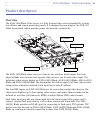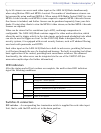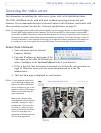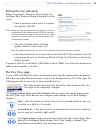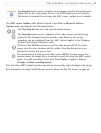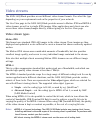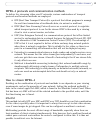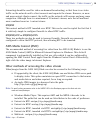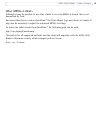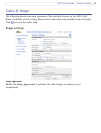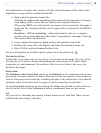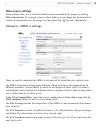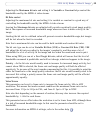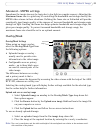
14
AXIS 243Q Blade - Video streams
Unicasting should be used for video-on-demand broadcasting, so that there is no video
traffic on the network until a client connects and requests the stream. However, as more
and more unicast clients connect, the traffic on the network will increase and may cause
congestion. Although there is a maximum of 20 unicast viewers, note that all multicast
users combined count as 1 unicast viewer.
RTP/RTSP
This unicast method is RTP tunneled over RTSP. This can be us
ed to exploit the fact that it
is relatively simple to configure firewalls to allow RTSP traffic.
RTP/RTSP/HTTP or RTP/RTSP/HTTPS
These two methods can also be used to traverse firewall
s. Firewalls are commonly
configured to allow the HTTP protocol, thus allowing RTP to be tunneled.
AXIS Media Control (AMC)
The recommended method of accessing live video from the AXIS 243Q Blade is to use the
AXIS Media Control (AMC) in Microsoft Internet Explorer in Windows. This ActiveX
component is automatically installed on first use, after which it can be configured by
opening the AMC Control Panel applet from the Windows Control Panel. Alternatively,
right-click the video image in Internet Explorer.
Other methods of accessing the video stream
Video/images from the AXIS 243Q Blade can also be accessed in the following ways:
• If supported by the client, the AXIS 243Q Blade can use
Motion JPEG server push
to display video. This option maintains an open HTTP connection to the browser
and sends data as and when required, for as long as required.
• As single JPEG images in a browser
. Enter the path:
http://<ip>/axis-cgi/jpg/image.cgi
Note:
To specify other parameters refer to the VAPIX® API in the Developer pages at the Axis web site
www.axis.com/developer.
• Windows Media Player. This requires AMC and the MPEG-4 decoder to be
installed. The paths that can be used are listed below in the order of preference.
• Unicast via RTP: axrtpu://<ip>/mpeg4/medi
a.amp
• Unicast via RTSP: axrtsp://<ip>/mpeg4/media.amp
• Unicast via RTSP, tunneled via HTTP: axrtsphttp://<ip>/mpeg4/media.amp
• Unicast via RTSP, tunneled via HTTPS: axrtsphttps://<ip>/mpeg4/media.amp
• Multicast: axrtpm://<ip>/mpeg4/media.amp
Note:
<ip> = IP address.



